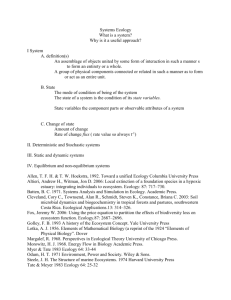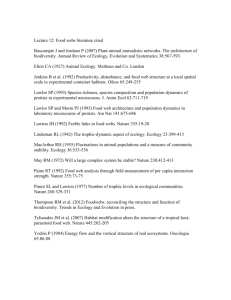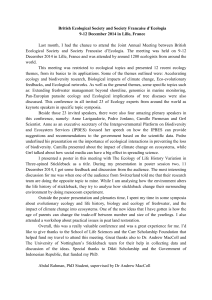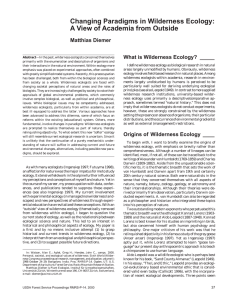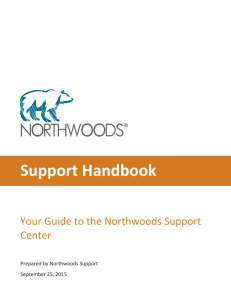It has been suggested that it is rare for a person to
advertisement
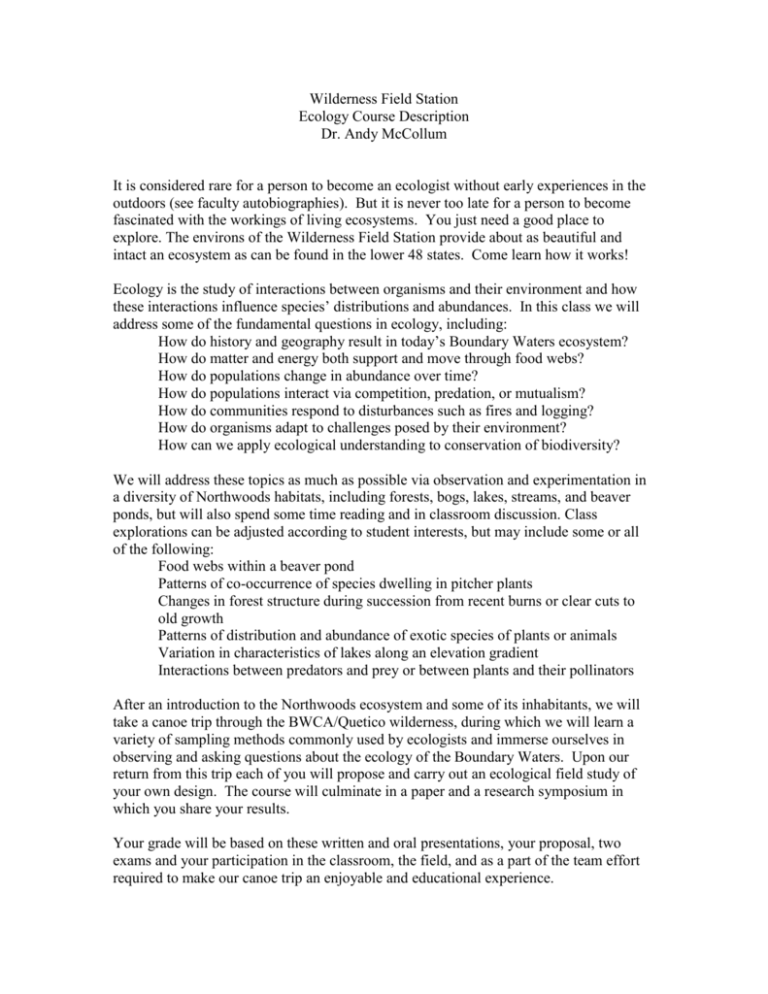
Wilderness Field Station Ecology Course Description Dr. Andy McCollum It is considered rare for a person to become an ecologist without early experiences in the outdoors (see faculty autobiographies). But it is never too late for a person to become fascinated with the workings of living ecosystems. You just need a good place to explore. The environs of the Wilderness Field Station provide about as beautiful and intact an ecosystem as can be found in the lower 48 states. Come learn how it works! Ecology is the study of interactions between organisms and their environment and how these interactions influence species’ distributions and abundances. In this class we will address some of the fundamental questions in ecology, including: How do history and geography result in today’s Boundary Waters ecosystem? How do matter and energy both support and move through food webs? How do populations change in abundance over time? How do populations interact via competition, predation, or mutualism? How do communities respond to disturbances such as fires and logging? How do organisms adapt to challenges posed by their environment? How can we apply ecological understanding to conservation of biodiversity? We will address these topics as much as possible via observation and experimentation in a diversity of Northwoods habitats, including forests, bogs, lakes, streams, and beaver ponds, but will also spend some time reading and in classroom discussion. Class explorations can be adjusted according to student interests, but may include some or all of the following: Food webs within a beaver pond Patterns of co-occurrence of species dwelling in pitcher plants Changes in forest structure during succession from recent burns or clear cuts to old growth Patterns of distribution and abundance of exotic species of plants or animals Variation in characteristics of lakes along an elevation gradient Interactions between predators and prey or between plants and their pollinators After an introduction to the Northwoods ecosystem and some of its inhabitants, we will take a canoe trip through the BWCA/Quetico wilderness, during which we will learn a variety of sampling methods commonly used by ecologists and immerse ourselves in observing and asking questions about the ecology of the Boundary Waters. Upon our return from this trip each of you will propose and carry out an ecological field study of your own design. The course will culminate in a paper and a research symposium in which you share your results. Your grade will be based on these written and oral presentations, your proposal, two exams and your participation in the classroom, the field, and as a part of the team effort required to make our canoe trip an enjoyable and educational experience. A final note: While this is a college class and ecology is a “rigorous scientific discipline”, I plan to both have fun and obtain solace from immersion in a stunning and majestic wilderness. I expect you will too! Required materials: I am aware that money is an issue for most college students – today more than in the recent past. I have taken that into account in choosing items for this course and believe you will be pleased at the results. Links are not intended to promote any vendor, but simply to help you find items. We will be using two texts, both of which will serve as valuable resources well into the future for anyone with an interest in biology. Ecology: From Individuals to Ecosystems 4th ed. by Michael Begon, Colin A. Townsend, and John L. Harper (Paperback - Jan 14, 2006) This is simultaneously the most comprehensive and the least expensive ecology textbook on the market (used copies are available for under $30.00!). How to Do Ecology: A Concise Handbook by Richard Karban and Mikaela Huntzinger (Paperback - Jul 31, 2006) This book, while aimed at ecology graduate students (people who need to start doing ecological research in earnest), is loaded with practical advice about all aspects of ecological research from planning to presenting it. It is well worth the $15.00 price tag. I recommend reading it before you arrive at the field station, but bring it with you as you will want to refer to it. Notebooks: You will need a notebook for the classroom – choose whatever type suits you. You will also need a waterproof field notebook. I recommend the hardcover ones. They still fit in your back pocket, but they hold up better than the paper or plastic covers. I will bring a supply of “Rite in the Rain” notebooks, which I will sell at cost. By purchasing them in larger lots, I pay less shipping (and use less fossil fuel) per book than you would by buying books individually and I can pass those savings on to you. If you prefer, you are welcome to purchase them on your own from Forestry Suppliers or other sources. Headlamp: Sure, you can bring a hand-held flashlight, but you will quickly find a LED headlamp more functional for reading and working at night. I have worked at night for 20 years and have found that even the cheapest ones from discount stores are perfectly serviceable. The ones with a red light option might be useful, as many people believe they are less disruptive of nocturnal animals. I recommend the AAA battery types over the coin cells for the simple expedience that the batteries are easier to find and last longer. One set of replacement batteries should get you through the entire term, but bring two sets, or better yet, bring a spare headlamp. It is hard to change batteries in the dark, but easy to turn on a backup light! Pencils: For field notes – they write when wet and do not run. Mechanical ones stay sharp, wooden ones can be sharpened with a knife. Pens: For class notes A good pocket knife or multi-tool: Don’t head into the wilderness without one. Don’t accept cheap imitations. Optional items: Binoculars: Something in the 7x to 10x range. Higher magnification makes for jittery viewing, lower magnification is hardly worth the trouble. I like good close focus capability for observing things like insects. Mask, fins, snorkel: There is a lot of water to look under and a lot of ecology happening down there! Compass, butane lighter, leather work gloves. These are almost as essential as the pocket knife. Getting lost is no fun, being lost and not being able to start a fire is less fun, and life around the camp is perennially hard on the hands. Field guide(s) to your favorite, or perhaps least well known, group(s) of Northwoods organisms. It is nice to be able to identify the players in the ecological pageant. Questions? Contact me! 319-895-4387 amccollum@cornellcollege.edu






